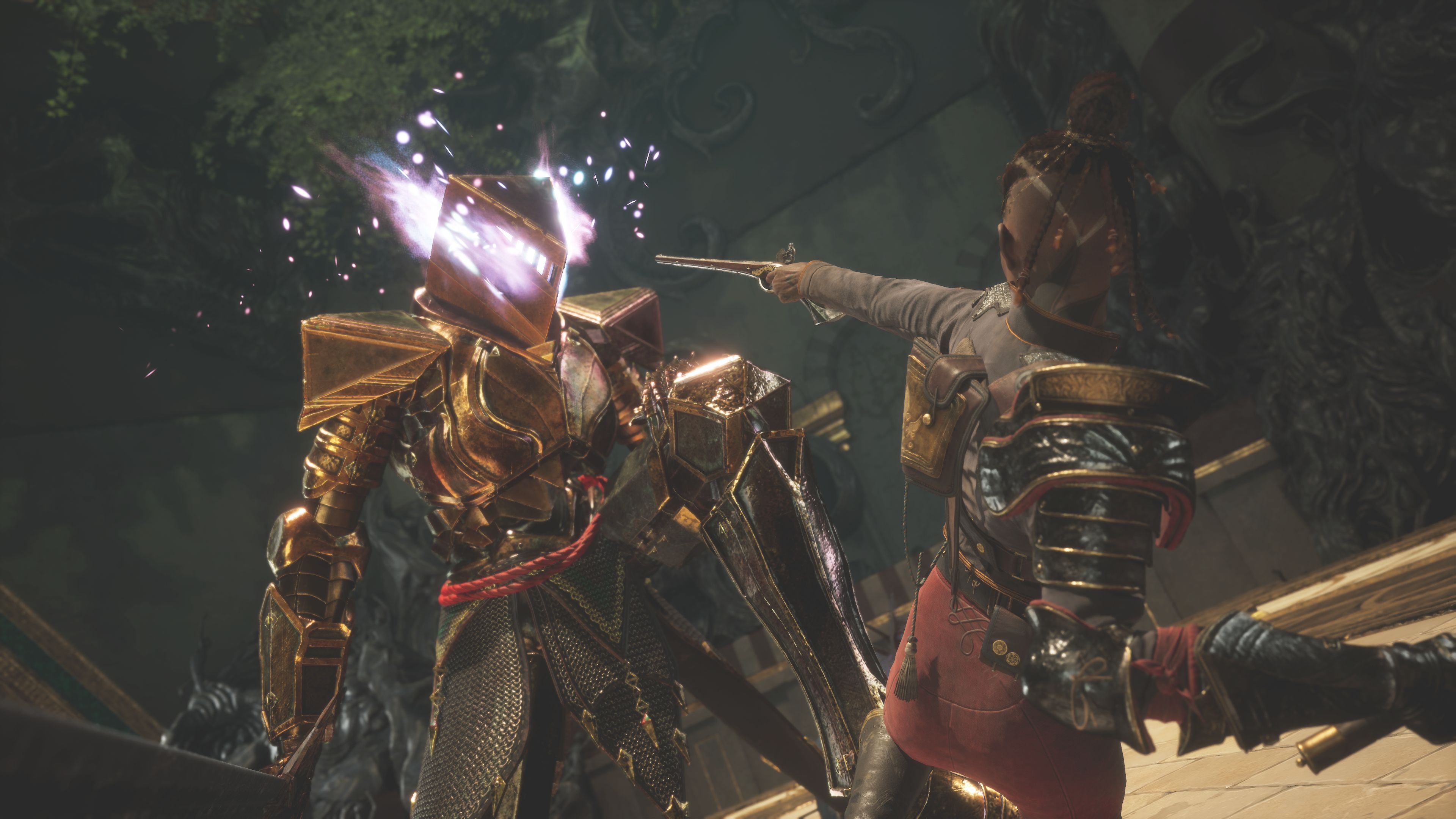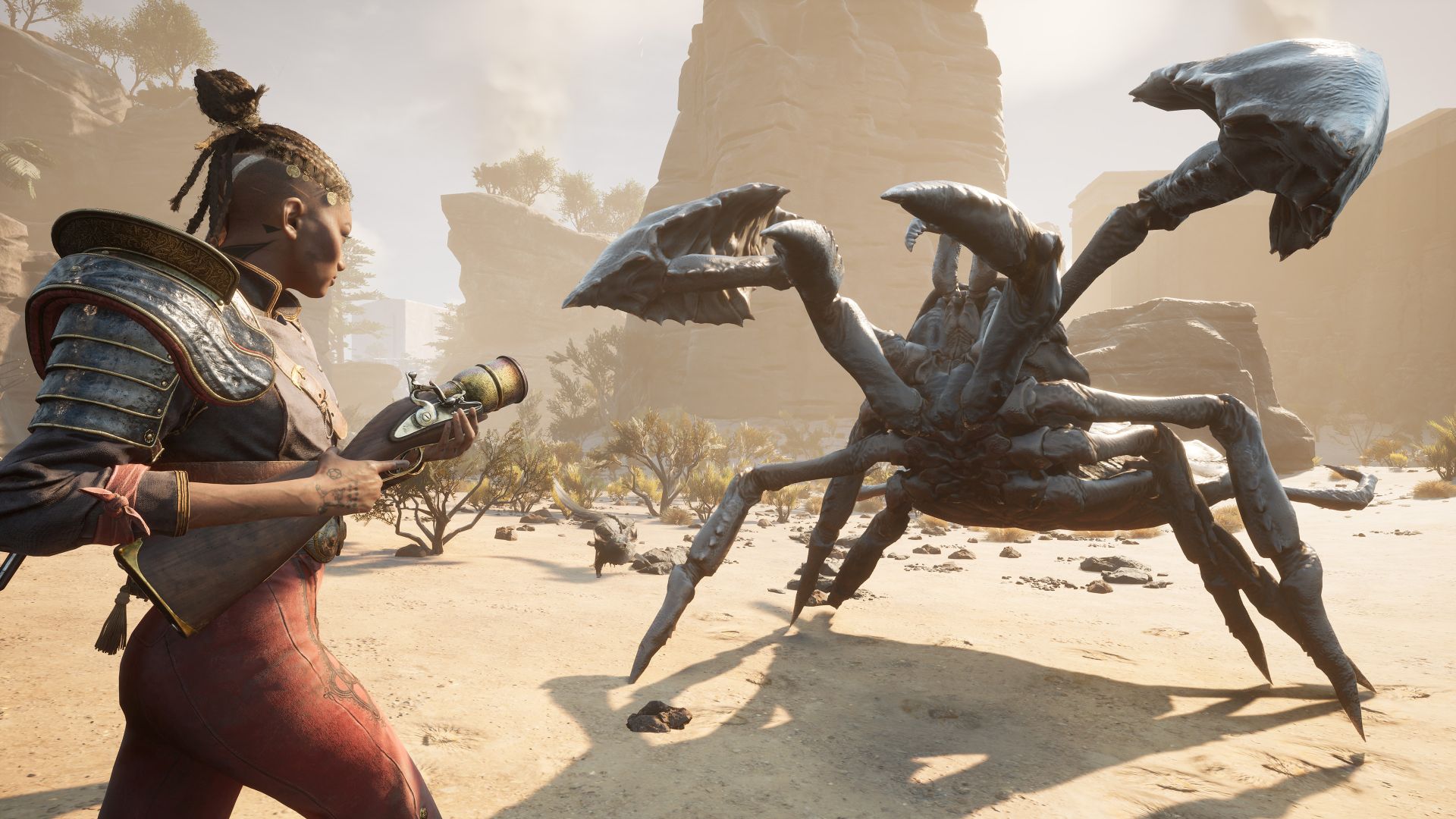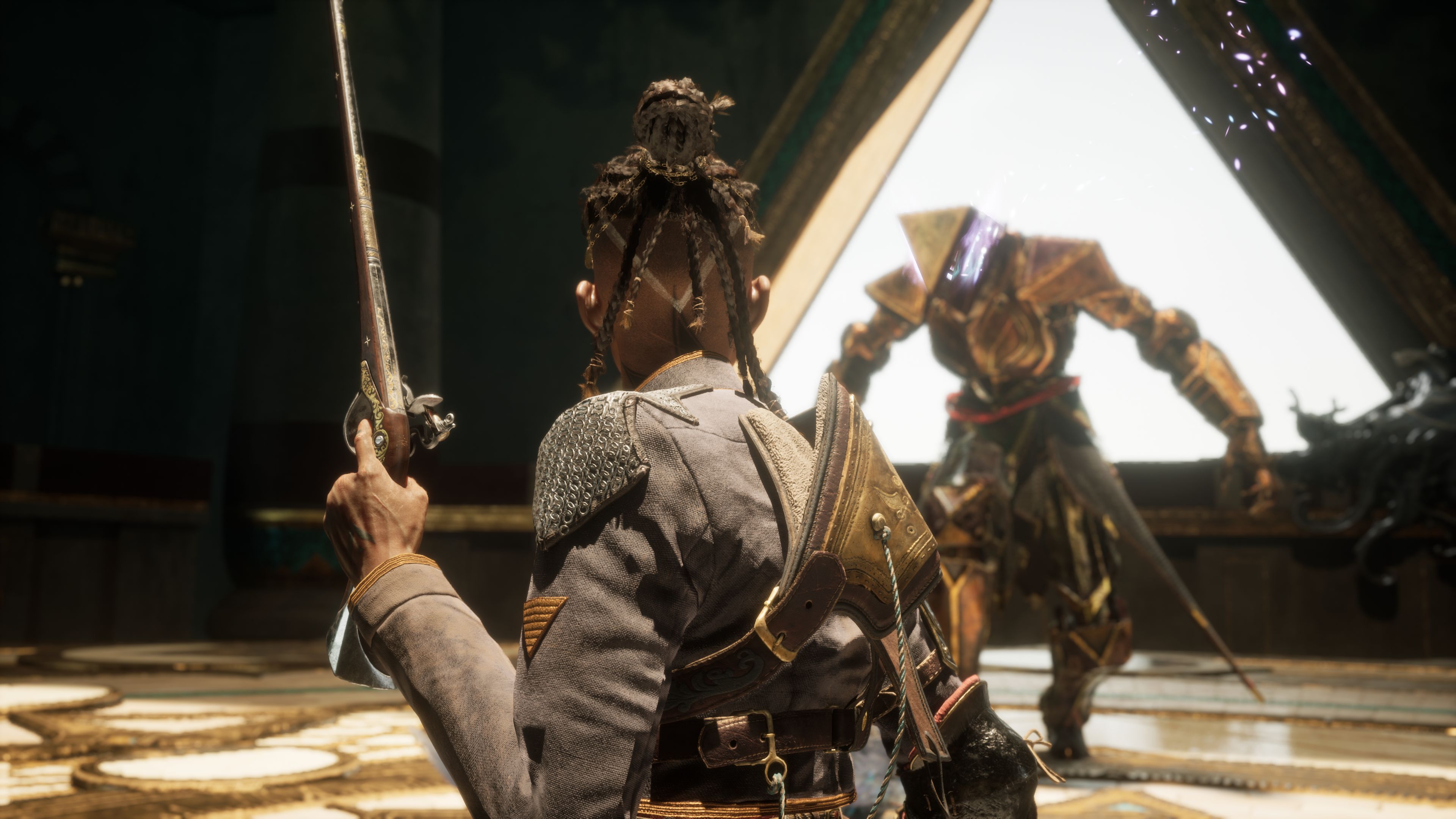
If my two-hour demo with Flintlock: Siege of Dawn has taught me anything, it's that more soulslikes should offer Sniper Elite-style killcams. Crouching at the bottom of a rickety set of stairs, I pop the head of an unassuming NPC with the help of my musket and a gratifyingly slow-motion killcam. A new avenue available to me, I continue my runback towards the boss that defeated me - only to eventually fall short of the 7,000 souls I dropped last time when I fumble a simple dodge against a generic enemy.
While that specific fate has been plaguing soulslike fans since the days of Demon Souls, Flintlock: Siege of Dawn is prepared to be a little less punishing than the games that helped inspire it. Billed as a Souls-lite, it weaves a collection of toys and some uncommon design philosophies into the formula, all of which are intended to make your fight against the forces of the gods a little more 'power-fantasy' and a little less 'Prepare to Die'. According to creative director Simon Dasan, that accessibility was built out of Flintlock developer A44's previous game, co-op soulslike Ashen: "We had the idea of making this more accessible early on, but without alienating the rhythmic combat from Dark Souls."
Flint-lock, stock

A door to hell has been opened in Flintlock's fantasy world, and the forces of the gods are pouring through it. Dasan tells me that the team was inspired by a literary subgenre, dubbed, appropriately enough, 'flintlock fantasy', a merging of Napoleonic real world ideas and towering, almost Lovecraftian monsters that's indicative of A44's desire to smash opposing influences together. As a sapper in a revolutionary war-style army (think muskets and sabres rather than rifles or plate armor), protagonist Nor journeys forth to try and stem the tide of undead. Conveniently armed with an ax and a trusty flintlock pistol, Nor starts her fight against little more than threat than a series of shuffling undead, but even those early fights show off one of Flintlock's more novel ideas.
With the demise of each opponent comes the collection of their essence; collect their essence to spend on upgrades, drop everything you've accrued if you die, lose it forever if you can't recover it before your next death. So far, so Soulslike. Where Flintlock differs is in the way it encourages you to gamble with what you've earned. Every successful hit adds a multiplier to the amount of souls you earn. That multiplier resets if you're struck by a foe, automatically banking what you've gathered, but reducing what you earn for subsequent kills until you can rebuild the meter. It's a smart tool – getting hit is never the aim, but this system forces you to play cleverly if you want to max out your earnings, and also gives you the chance to manually reset your own multiplier if you don't fancy your chances against an upcoming foe. Everything becomes a gamble, as getting hit even once is now a hefty punishment in itself if you waste a good combo in a gutsy overreach.
And two smoking barrels

While this tendency towards gambling is evidence of Flintlock being prepared to be a little harsher than Dark Souls or God of War, it offers plenty of tools to make up for that. The musket is one of those – a delightfully clunky weapon, complete with a manual reloading skill-test that amps up its damage if you succeed. A series of double-jumps and aerial dashes is another trick up Nor's sleeve, opening different avenues through some of the game's more open areas. Vulpine companion Enki offers his own suite of bonuses that seem particularly devastating in close combat. But the star of the show remains Nor's Flintlock.
An ornate pistol that recharges its ammo with each successful melee hit landed against an opponent, the flintlock deals a big punch of damage, but also automatically staggers an enemy. That can be handy for thinning a herd of creatures shuffling towards you, but you won't want to blow your entire magazine on low-level enemies; the Flintlock can knock opponents out of any combo, making it crucial when taking on enemies - particularly bosses - with fancy movesets or unblockable attacks.
I only really took it into battle against one mini-boss, but once I'd mastered exactly when to pull the trigger, the Flintlock almost felt overpowered. The second I was worried about taking a hit, I could fire a shot, stagger my foe, and immediately recharge my ammo by wailing on them with a few quick strikes. I'm sure that later bosses won't be as easy to counter, and the pistol is dramatically less effective against larger groups of even basic enemies, but it feels excellent to fire a shot into a foe that's rearing up for some devastating attack and see them crumple dramatically to the floor.
Weekly digests, tales from the communities you love, and more
All those different tools make for a neat change to the soulslike formula. While the runback to Dark Souls' Ornsteinn and Smough, for example, is burned into my brain, the number of different ways in which I could tackle Flintlock's environments meant that I was still finding new methods of approach on my successful last attempt at the demo's final boss. There's no denying that Nor's versatility makes for a less punishing experience than Soulslike diehards might be looking for, but Dasan says "it was really important to make sure we didn't alienate the people who really do love a tougher experience." It's clear that Flintlock doesn't feel a need to settle into a specific niche, but it's that flexibility – and a desire to push seemingly-opposing forces against each other – that could push an already rapidly-evolving genre even further.
It's not just Elden Ring – here are 5 soulslikes we're prepared to die over at Summer Game Fest.

I'm GamesRadar's Managing Editor for news, shaping the news strategy across the team. I started my journalistic career while getting my degree in English Literature at the University of Warwick, where I also worked as Games Editor on the student newspaper, The Boar. Since then, I've run the news sections at PCGamesN and Kotaku UK, and also regularly contributed to PC Gamer. As you might be able to tell, PC is my platform of choice, so you can regularly find me playing League of Legends or Steam's latest indie hit.


